|
| |
This week in: Peace & Security Publications |
IPSI | Africa | Americas | East Asia | Middle East | South Asia
|
|
|
|
| |
This week in Peace & Security Publications
|
|
|
|
| |
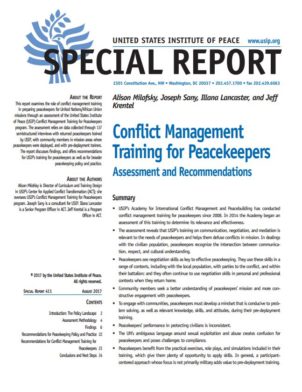
USIP: In 2014, then UN secretary general Ban Ki-Moon appointed a High-Level Independent Panel on Peace Operations (HIPPO) to assess the current state of peace operations and determine needs for the future. This assessment is one…
|
|
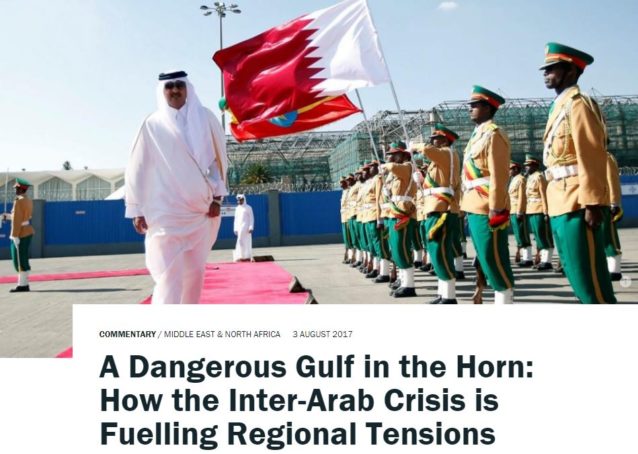
Crisis Group: The Gulf and the Horn are intricately intertwined regions that face common threats and vulnerabilities: armed conflict, transnational jihadism and organised crime, including piracy, human trafficking and money laundering. The current crisis comes at a difficult…
|
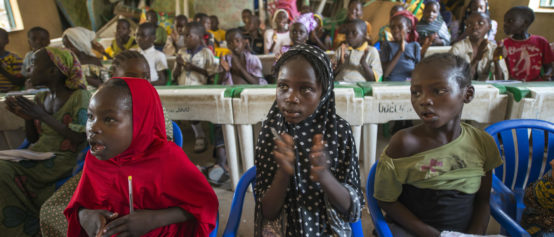
International Rescue Committee: Ruth is one of over a million children who have been forced to flee the fighting in northeast Nigeria, many leaving their homes with nothing but the clothes they wore. “Boko Haram went from house to house killing everybody,” Ruth recalls. “We had to…
|
|
|
|
|
|
| |

Sarajevo Blogs! Experience the Sarajevo Symposium on Post-Conflict Transitions through the eyes of the participants in their daily blog!
|

Bologna Blogs! Learn more about Bologna Symposium by reading our blog written by participants from this summer!
|
|
|
|
|
|
| |
This week in Sub-Saharan Africa
|
|
|
|
| |
NIGERIA: Suicide bombers killed 27
On Tuesday, a female suicide bomber detonated at a market in Maidiguru, northeast Nigeria. Two other suicide bombers blew themselves up outside a refugee camp near Maidiguri. 27 were killed and 83 were wounded in total. International news agencies suspect Boko Haram of orchestrating the attack. Comment: Boko Haram has been fighting to create an Islamic state in northeast Nigeria for the past eight years. Nigeria’s military has been regaining territory from Boko Haram in the past year, but Boko Haram has responded with a series of attacks using women and children suicide bombers. (TheTribune, RipplesNigeria, Reuters)
|
|
|
|
| |
SIERRA LEONE: 400 dead after mudslides
On Monday night, a mudslide in Freetown left nearly 400 dead and over 2,500 homeless after three days of rains. Most of the victims were sleeping, when a mountainside collapsed due to the rain, escalating to a mudslide. In the Juba community, the flood destroyed two bridges, trapping dozens. President Koroma is calling for international support to prevent disease outbreak as the rains are expected to continue in the coming weeks. Comment: The country has been experiencing increased flooding in recent years. In 2015, a flood in Freetown killed 10. (ConcordTimes, AllAfrica, AlJazeera)
|
|
|
|
|
| |
SOMALIA: Former senior militant al Shabaab leader calls militants to leave group
On Sunday, Abu Mansoor Mukhtar Robow, former senior militant of al Shabaab in Somalia, surrendered to government forces and is now calling others to surrender as well. Robow left the group in 2013 after ideological disagreements with other top leadership. He had been hiding in the jungle with his soldiers. Comment: According to international news agencies, Robow turned himself in to be safe from persecution by other al Shabaab members. (AllAfrica, Reuters, NYTimes)
Researched/Written by Angelica Aimé Silfa
|
|
|
|
|
| |
This week in the Americas & Caribbean
|
|
|
|
| |
BOLIVIA: Highway approved through Amazon biodiversity hotspot
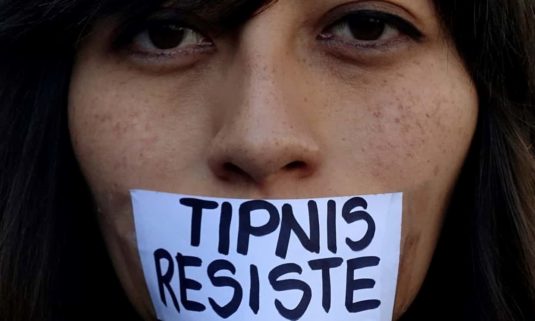
|
|
On Sunday, President Evo Morales enacted a new law enabling the construction of a 300km road that will cut through an Amazon biodiversity hotspot known as the Isiboro Sécure Indigenous Territory and National Park (TIPNIS). Morales accused developed countries of “colonial environmentalism,” arguing that a more advanced infrastructure would connect indigenous people with more education, health institutions, and electricity. The majority of local authorities and the governor of Beni, Bolivia’s main Amazon region, back the law. Activists from rival political parties, the Catholic church, and various indigenous groups marched in several cities across the country in opposition to Morales’ “capitalism and extractivism”. Comment: TIPNIS covers 10,000km2 and is home to 14,000 mostly Indigenous people. In 2011, violent clashes between thousands of protesters and the police pressured the government to suspend the road project. Many activists believe the road will increase mining, oil and gas exploitation, logging and coca plantation activities. The Bolivian Institute for Strategic Research predicted a 64 per cent rate of deforestation in TIPNIS within 15 years if the road is built, compared to 43 percent if no road is constructed. (El Deber, TeleSur, The Guardian 1, 2)
|
|
|
|
|
| |
COLOMBIA: Peace process enters second phase as UN disarmament process officially ends
On Tuesday, the disarmament process of the FARC officially ended, with the removal of the last remaining container of more than 8,000 arms stored in 26 demobilization sites by UN observers. The reincorporation of ex-combatants from current Transitional Standardization Zones will lead to Territorial Spaces of Training and Reincorporation across the country. FARC leader Ivan Marquez announced their new political movement’s name as the “Revolutionary Alternative Force of Colombia”, which is to be officially converted to a political party on September 1. Comment: FARC members criticized the state for “failing to efficiently dismantle paramilitarism in the country” and ensure the physical security of demobilized rebels. Indeed, the second phase of the peace process comes amid growing assassinations of demobilized rebel members, including the murder of FARC leader Jesus Adan Mazo on Monday, and a rise in illicit activities due to the power vacuum caused by the FARC’s disarmament. (El Colombiano, El Nuevo Herald, MercoPress, TeleSur, Garda World, The Associated Press)
|
|
|
|
|
| |
UNITED STATES: Violent clashes between white nationalists and counter-protesters; Vehicle rams into crowd
| |

|
On Saturday, a neo-Nazi sympathizer drove a vehicle into a group of people protesting against the “Unite the Right” white nationalist demonstration in Charlottesville, Virginia, killing a 32-year-old woman and wounding 19. The 20-year-old suspect, James Fields from Ohio, was wearing a Vanguard America (neo-Nazi) uniform, but it remains unclear whether he acted alone or colluded with others. Fields faces charges of second-degree murder for the killing of Heather Heyer, malicious wounding, and failure to stop in an accident that resulted in death. He is one of 4 people who has been arrested over the violent clashes between far-right protesters and counter-protesters. The FBI has opened a civil rights’ investigation. Comment: The right-wing demonstration was held in protest against the removal of the Confederate statue of Robert E. Lee, a move that had previously prompted protests in other cities like Orlando, Florida, and Richmond, Virginia, in May. Among the white nationalist protesters were neo-Nazis, KKK members, and other white supremacists. On Wednesday, four other Confederate-linked monuments were taken down by officials in Baltimore, Maryland. (The Baltimore Sun, Jane’s, Garda News, Reuters, The Associated Press)
Researched/Written by Nastasia Stipo
|
|
|
|
|
| |
This week in East Asia & Pacific
|
|
|
|
| |
MYANMAR: Government deploys troops, impose curfew amidst rising tension in Rakhine province
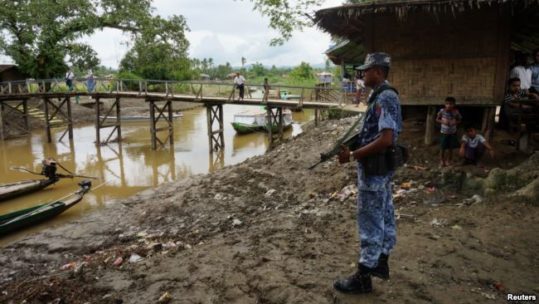
|
|
On Saturday, the Myanmar government confirmed a military buildup of troops in Rakhine State to combat Arakan Rohingya Salvation Army (ARSA) insurgents in the region. Yanghee Lee, the UN special rapporteur on human rights in Myanmar claimed the development was “cause for major concern” due to fears of violence against the Royhinga, a Muslim minority group present in Rakhine. Comments: The Muslim Rohingya are an often maligned minority in Buddhist majority Myanmar, denied citizenship and other legal rights. A terrorist attack by Rohingya insurgents in October of 2016 sparked a violent counter-offensive by government troops against the minority. Over 75,000 Rohingya fled Myanmar to neighboring countries, accusing the military of human rights abuses and genocide. The government adamantly rejects the allegations and refuses to let a UN delegation investigate the supposed violations. (Reuters, South China Morning Post, UN News, Asia Times)
|
|
|
|
|
| |
PHILIPPINES: Filipino police kill 60, arrest 223, in massive drug raids
On Thursday night, police killed 28 people while conducting a massive anti-drug raid in Manila. A similar raid in nearby northern Bulacan province on Monday evening resulted in 32 casualties. During the three day period, police arrested 223 individuals, mostly suspected petty criminals, street dealers, and drug addicts. According to police reports, those who were killed resisted arrest. In reflecting on Monday night’s raid, President Duterte applauded the police’s efforts, saying, “That’s good…Let’s kill another 32 every day. Maybe we can reduce what ails this country.” Comment: Elected last year, President Duterte swiftly implemented a nationwide anti-drug campaign that police report has resulted in the deaths of 3,400 people. This week’s raids, resulting in 60 casualties, makes it the deadliest period in President Duterte’s nationwide war on drugs. (Reuters, The Inquirer, Channel News Asia)
|
|
|
|
|
| |
SOUTH KOREA: Protesters march in support and against THAAD in Seoul
| |
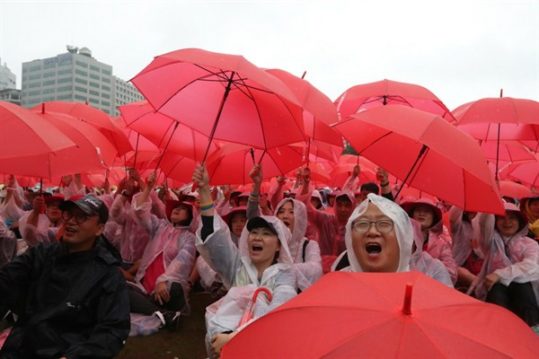
|
On Tuesday, protesters in Seoul organized two, separate rallies in support and opposition to THAAD (Terminal High Altitude Area Defense), the U.S.-led anti-missile system. A reported number of 10,000 THAAD opposition protesters marched to the U.S. embassy, but were blocked by riot police. A protest in support of THADD was held a few kilometers away in Gwanghwamun Square. 6,500 riot police patrolled both rallies and separated by a barricade of buses. Comment: The U.S. government-sponsored THAAD is a defense system designed to target and neutralize intermediate range missiles from North Korea. Korean citizens who oppose THAAD believe it will escalate tensions between South and North Korea, while those in support argues the system is necessary to protect the country. Two launchers and radar are currently operational in South Korea’s North Gyeongsang Province, while the remaining four launchers are stored at a U.S. base in South Korea awaiting installment. (Korea Herald, South China Morning Post, The Straits Times, Xinhua)
Researched/Written by Laura Bisbee
|
|
|
|
|
| |
This week in Europe & Central Asia
|
|
|
|
| |
IRELAND/UK: Post-Brexit plans for borders to remain “frictionless”

|
|
On Tuesday, Britain revealed post-Brexit plans to keep borders open between Northern Ireland and the Republic of Ireland in order to uphold and preserve the Good Friday peace agreement. Britain also intends to exempt small traders and farmers crossing the border, and according to Northern Ireland minister James Brokenshire, aims “to find a practical solution that recognizes the unique economic, social and cultural context of the land border with Ireland, without creating any new obstacles to trade within the UK.” Comment: Though the Irish Republic’s Minister for Foreign Affairs has claimed that the ability to create new trade deals after Brexit “are not realistic,” the Irish government has largely welcomed Britain’s proposals and called for further talks in Brussels at the end of the month to continue discussing key issues of citizens’ rights and customs issues. There are over 300 miles of border between Northern Ireland and the Irish Republic, with 275 border crossings. (Irish Farmers Journal, Express, CNBC, The Guardian, BBC, Reuters)
|
|
|
|
|
| |
SPAIN: Authorities rescue nearly 600 migrants in 24 hours
| |
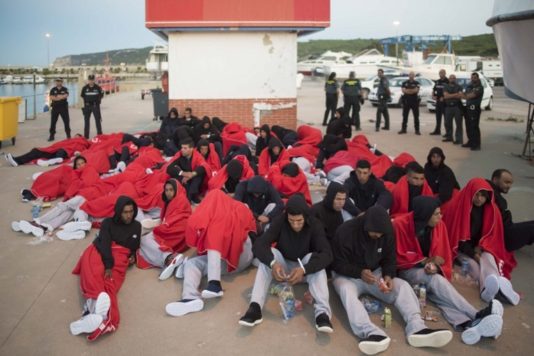
|
On Wednesday, Spanish coastguards rescued nearly 600 migrants from fifteen different vessels arriving through the Strait of Gibraltar, including 35 children and a baby. This route from Morocco to Spain, only 12 km, is becoming more popular with migrants from sub-Saharan Africa as it is seen as being much safer than longer routes crossing the Sahara and Libya to Italy. A spokesperson for the Spanish coastguard said that such a high number of migrants arriving in Spain this summer are unusual, and according to the International Organization for Migration (IOM), the number of migrants arriving in Spain as of August 6 is triple the number recorded at the same time last year. Comment: If this trend continues, Spain could overtake Greece before the end of the year with the largest number of migrants arriving by sea. The number of sea arrivals does not take into account migrants coming by land through Ceuta and Melilla, two Spanish territories in Morocco that are the EU’s only land borders with Africa. (The Local 1, 2, BBC, AP)
|
|
|
|
|
| |
SPAIN: Van careens through Barcelona tourist area in IS terror attack; 13 dead, more than 100 injured
On Thursday, a van tore through crowds of pedestrians and tourists in the la Rambla promenade in Barcelona, killing 13 and injuring more than 100. Two suspects have been arrested in connection with the attack, and a third was killed in a shootout with police. The self-proclaimed Islamic State (IS) has claimed responsibility for the attack, and Spanish police believe there is a connection between the van attack and an explosion that took place about 124 miles south of Barcelona late Wednesday night, killing one and injuring seven. Comment: Barcelona is the latest European city to experience vehicle attacks in public areas, following similar attacks in Nice, London, and Berlin in the last year. Leaders from around the world, including Prime Minister Theresa May and President Donald Trump, have shared their support for those affected and condemned the attack. The investigation into the attack is ongoing. (El Pais, NPR, CNN, BBC)
|
|
|
|
|
| |
This week in the Middle East & North Africa
|
|
|
|
| |
BAHRAIN: Bahrain state TV accuses Qatar of trying to oust government in 2011
On Wednesday, Bahrain’s state TV channel aired a report that claimed Qatar was behind anti-government protests that shook Bahrain in 2011. It reported that Qatar’s former prime minister, Sheikh Hamad bin Jassem Al-Thani, had contacted Ali Salman in 2011. Al-Thani asked Salman, then head of Al-Wefaq, the largest opposition Shia party in Bahrain, to urge protesters to flood the streets and escalate unrest. A court order, carried by the state-run Bahrain News Agency (BNA), said attorney general Ali al-Bouainen had launched an investigation into the phone calls. Comment: Ali Salman was jailed in 2015 after being convicted of inciting hatred, promoting disobedience, and insulting public institutions; Wefaq was dissolved last year for allegedly fomenting sectarian unrest. (Middle East Observer, The New Arab, BBC)
|
|
|
|
|
| |
LEBANON: Lebanon abolishes ‘marry your rapist’ law
On Wednesday, Lebanon’s parliament abolished article 522 of the penal code, which dates back to 1943, that absolves rapists if they marry their victims, joining other Arab states that have repealed “marry-your-rapist” laws in recent weeks. Justice Minister Salim Jrayssati said he would consult women’s rights groups to “see if there’s a need for other or more amendments.” Lawmaker Elie Kayrouz, who supported ending the law, said other clauses also require change to protect women and children. Comment: Jordan abolished a similar marriage law this month, and Tunisia passed a law in July to protect women against violence, which included abolishing a similar clause. (An-Nahar, France24, Reuters)
|
|
|
|
|
| |
SAUDI ARABIA: Saudi border to open for Qatari pilgrims
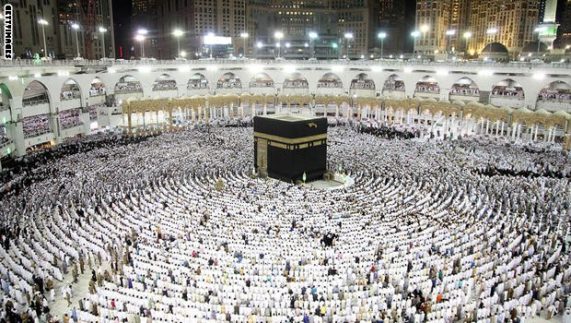
|
|
On Thursday, a statement on the official Saudi Press Agency said the Salwa border point would be open for Qatari pilgrims to pass through without the usually needed electronic permissions. Additionally, the Saudi King Salman bin Abdulaziz Al Saud invited the Qatari pilgrims to perform Hajj at his expense including flights, according to the statement. Qatar welcomed the Saudi decision to open the border and provide flights for pilgrims. Saudi-owned al-Arabiya television and state television reported that 50 Qatari pilgrims had entered Saudi territory on Thursday through the Salwa crossing, which was opened for the first time since the four-nation boycott of Qatar began. Comment: The decision came after Saudi Crown Prince Mohammed bin Salman held a surprise meeting at the Peace Palace in Jeddah with a Qatari royal family member, Sheikh Abdullah bin Ali bin Abdullah bin Jassem Al Thani, whose branch of the family was ousted in a palace coup in 1972. (An-Nahar, Raialyoum, BBC, Reuters)
Researched/Written by Atika Alkhallouf
|
|
|
|
|
| |
INDIA: Plan to forcibly deploy Rohingya back to Myanmar
On Wednesday, Deputy Interior Minister Kiren Rijiju announced that 40,000 Rohingyas living in India will be deported back to Myanmar, claiming the Rohingya’s registration with the UN refugee agency (UNHRC) in India is irrelevant. According to Human Rights Watch (HRW), if India is aware of security risks and abuse in Myanmar, they have an obligation to protect the Rohingya under international refugee law. Comment: About 16,500 Rohingya living in India are registered with the UNHCR, but tens of thousands are estimated not to be registered. (Human Rights Watch, Al Jazeera, AP)
|
|
|
|
|
| |
INDIA: Bengaluru’s Bellandur and Varthur lakes spits toxic foam into streets
After heavy rainfall on Tuesday, toxic foam from the Bellendur and Varthur lakes overflowed into streets, homes, and vehicles Wednesday night. The lakes have been used as dumping grounds for various toxic wastes. The excess rainfall causes foaming due to chemicals, such as ammonia, phosphate and low dissolved oxygen. Chief Minister Siddaramaiah claims “…it will be solved within one or two years. The government is taking all necessary actions.” Comment: This is not the first time Bellandur Lake spilled toxic foam; the last time took place in April after a mound of garbage was set on fire in February, causing mass pollution. (The Indian Express, India Times, Daily Mail)
|
|
|
|
|
| |
PAKISTAN: Blast in Quetta
On Saturday, a terror attack targeting an on-duty military vehicle killed 15 and injured 30 in Quetta. Of those killed, eight were military personnel and seven were civilians. Other vehicles parked nearby caught fire. The self-proclaimed Islamic State claimed responsibility for the attack. Comment: This blast occurred two days before Pakistan’s 70th Independence Day celebration. The bomb went off in an area close to the stadium where the Independence Day festivities still took place two days later. (Dunya News, The News International, Deccan Chronicle, Al Jazeera, Reuters)
|
|
|
|
|
| |
REGIONAL: Monsoon flooding and landslides in India, Nepal, and Bangladesh kill at least 245
This week, more than 245 people died in result as a result of flooding and landslides in India, Nepal and Bangladesh. In Nepal, the death toll currently stands at 115 with 38 missing. In Bangladesh, more than 500,000 fled their homes seeking shelter and 39 died. In India, the monsoon affected more than six million, with the flooding killing 56 in Bihar and 15 in Assam. Comment: The crisis may escalate as rivers carry rainwater downstream into low-lying, densely populated areas. Heavy monsoon rains fall annually June through September, but cause casualties and property damage. (The Daily Star, The Guardian, BBC, Reuters, AP)
Researched/Written by Rabia Uddin
|
|
|
|
|